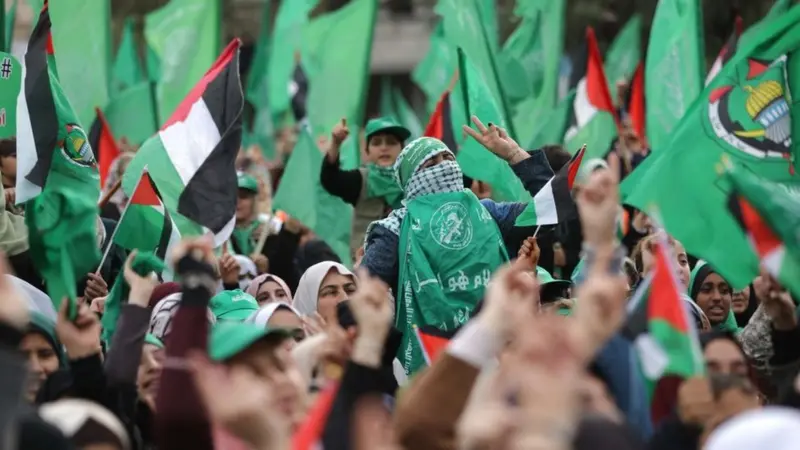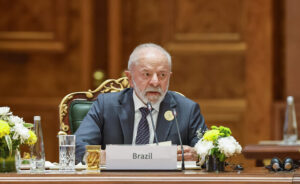
Published 10/31/2024 11:27
“Palestinians look at everything from a broad, long-term perspective,” he said in an interview with the Israeli newspaper Haaretz in 2019. “They see that at the moment there are five, six and seven million Jews here, surrounded by hundreds of millions of Arabs. They have no reason to give in, because the Jewish state cannot last. They are destined to win. In another 30 to 50 years, they will beat us, no matter what.”
Morris is right. He is correct in that the Palestinians will not give up, that there can never be a situation in which societies survive indefinitely and prosper within a permanent matrix of racial segregation, violence and exclusion – exclusion of the other, the Palestinians, and isolation of me.
The history of Palestine itself is a testimony to this truth. If the oppressed, the natives of the land, are not completely defeated or decimated, they are likely to rise up, fight and regain their freedom.
It must be extremely frustrating for Israel that all the ongoing death and destruction in Gaza has not been enough to affect the overall outcome of the war: the “total victory” that Netanyahu continues to talk about.
Israel’s frustration is understandable because, like all past military occupiers, Tel Aviv continues to believe that the right amount of violence should be enough to subdue colonized nations.
But Palestinians have a different intellectual trajectory that guides their collective behavior.
Among the many classifications of history, modern French historians make a separation between “histoire événementielle” – history of events – and “longue durée” – history of long duration. In short, the former believe that history is the result of the accumulation of consequential events over time, while the latter see history on a much more complex level.
Seen only in its entirety
Reliable history can only be seen in its entirety, not just the totality of events in history, recent or ancient, but the sum of feelings, the culmination of ideas, the evolution of collective consciousness, identities, relationships, and the subtle changes that occur in societies over time.
The Palestinians are the perfect example that history is shaped by ideas, not weapons; for memories, not politics; for collective hope, not for international relations. They will eventually win their freedom, because they have invested in a long-term trajectory of ideas, memories and community aspirations, which often translate into spirituality or, better said, into a deep and immovable faith that grows stronger, even in times of horrible wars. .
In an interview I conducted with former United Nations special rapporteur Professor Richard Falk in 2020, he summarized the struggle in Palestine as a war between those with weapons and those with legitimacy. He said that, in the context of national liberation movements, there are two types of war: real war, such as that of soldiers carrying weapons, and the war of legitimacy. Whoever wins the last one will end up prevailing.
Palestinians, in fact, “look at everything from a broad, long-term perspective.” Agreeing with Morris’s statement may seem strange since, after all, societies are often driven by their own class struggles and socioeconomic agendas rather than a unified and cohesive long-term vision.
It is at this point that the longue durée becomes more relevant in the Palestinian case. Even though Palestinians have not made a common agreement to wait for the invaders to leave or for Palestine to return to being a place of social, racial and religious coexistence, they are driven, even if subconsciously, by the same energy that drove their ancestors to resist. to injustice in all its forms.
While many Western politicians and academics are busy blaming Palestinians for their own oppression, Palestinian society continues to evolve based on entirely independent dynamics. For example, in Palestine, sumud, or resilience, is a deep-rooted culture, hardly subject to external stimuli, political or academic. It is a culture as old as time. Innate. Intuitive. Generational.
This Palestinian saga began long before the war, long before Israel, long before modern colonialism. This truth demonstrates that history is not driven by mere events, but by countless other factors; that while “event history” – the political, military and economic aspects that contribute to the construction of history through short-term events – is important, long-term history offers a deeper understanding of the past and its consequences. consequences.
This discussion must involve all those who care about the struggle in Palestine and who are interested in presenting a version of the truth that is not motivated by future political interests, but by a deep understanding of the past. Only then can we begin to slowly liberate the Palestinian narrative from all the convenient stories imposed on the Palestinian people.
This is not an easy task, but it is inevitable, as it is essential to break the limits of overlapping language, historical events, recurring dates, inhumane statistics and outright deception.
Ultimately, it should be clear to any astute reader of history that while fighter jets and bunker-busting bombs may affect short-term historical events, courage, faith, and communal love determine long-term history. This is why the Palestinians are winning the war of legitimacy and why freedom for the Palestinian people is only a matter of time.
(Article published in People’s World https://www.peoplesworld.org/article/why-are-palestinians-winning-the-legitimacy-war/ )
__
*Translated by the editorial team
Source: vermelho.org.br

